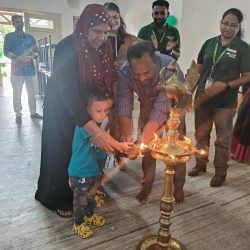The Hidden World of Women Caregivers
Krishnaraj Nambiar, Volunteer Pallium India and FOMAA Project Team Member, writes:
Her aged husband has been paralysed following a Cerebrovascular Accident (CVA). A second tragedy followed, when she lost her young son who was her only support.
Her husband is a paraplegic. She sets an alarm at night to turn him in bed every two hours so that he doesn’t get bed sores.
She lives alone with her husband who is a heart patient and less mobile following a spinal injury. She has to leave her house at 5 a.m. to support her ailing husband to run her tea shop.
Her son (aged 34) and daughter (aged 36) are completely bedridden since the last 30 years. Her husband is a coolie.
These were the stories of four women caregivers that were presented in the documentary titled “Support-A different story” by Ms.Beena Paul and Ms.Raakhee, at the workshop on the ‘Hidden World of Women Care Givers’, organized by Women’s wing of Federation of Malayalees Association of Americas (FOMAA) and Pallium India, on 3 December, 2018 at Mannam memorial Hall, Trivandrum. About 50 care givers and a few of their family members, as well as Pallium India’s volunteers and invited guests from various fields attended the workshop.

Ms. Mangala Francis, Pallium India’s volunteer and coordinator of the FOMAA project, who welcomed the participants explained that the objective of the workshop was to bring together women care givers associated with Pallium India, provide them with a forum, listen to the challenges they face and acknowledge their contribution.
Pallium India, with the funds from FOMAA, provides support to women caregivers to start income generation activities. The workshop was part of Pallium India’s efforts to systematise its work with women caregivers and create awareness about the hidden world of women caregivers who globally account for 80% of all caregivers.
Following the documentary screening, Ashla Rani reflected on her experience as a person receiving care, especially from her mother. Ashla appealed for recognition of care givers, particularly women, whose services are unacknowledged. Ms. Reshmi spoke as a care giver and highlighted the travails faced by women in providing care and working to earn an income to run the family.
The next segment included a panel. Ms.Sonia George from the Self Employed Women’s Association (SEWA) described the work of SEWA for the protection of rights of self-employed women. She stressed that women care givers should come together to break their isolation and should consider their problems as a social issue. Dr. Sreedevi from Pallium India, based on her daily experience in dealing with care givers, said that the role played by women care givers are taken as normal and no one acknowledges their immense sacrifice. She suggested that assistance should be provided to women care givers to enable them to take a break from their routine. Ms. Asha from Kerala Mahila Samakhya Society spoke about her work with marginalised women particularly with regard to violence faced by them and how this workshop has made her reflect about the issue of women care givers. Ms.Asha Nair from the Women’s Development Corporation (WDC) explained various schemes conducted by WDC and promised to include women care givers in their projects and programmes.
 The panel presentation was followed by an open discussion moderated by Ms. Jyothi Krishnan (Independent researcher/consultant). Several women caregivers narrated their experiences, some were choking with emotion as they spoke and the audience were overwhelmed by their ordeal. A few also requested help to start a grocery, buy a sewing machine etc. Dr.Sulochana, former Professor from the Kerala Agricultural College, shared information about her NGO named ADISHA which is providing training to women to grow vegetables and mushroom cultivation.
The panel presentation was followed by an open discussion moderated by Ms. Jyothi Krishnan (Independent researcher/consultant). Several women caregivers narrated their experiences, some were choking with emotion as they spoke and the audience were overwhelmed by their ordeal. A few also requested help to start a grocery, buy a sewing machine etc. Dr.Sulochana, former Professor from the Kerala Agricultural College, shared information about her NGO named ADISHA which is providing training to women to grow vegetables and mushroom cultivation.
Ms. Jyothi summarised the main points made by the panellists and the interventions from the participants. She said that there must be dissemination of information to the beneficiaries of their entitlements in various government schemes. She was sceptical if a role reversal would take place in society of men sharing the woman’s burden and added that it was society’s responsibility to ensure that happens. The main message she conveyed was regarding the need for providing not just material support to women caregivers but ensuring that the society acknowledges their role and contribution. She also reaffirmed a suggestion made from the floor for conducting a systematic study of problems faced by women care givers and the role of various governmental and non-governmental agencies in mitigating them.
The workshop was also attended by Mr.Jain Kannanchamparambil, Joint Treasurer of FOMAA . He appreciated the efforts made by Pallium India to support women care givers and the organization of the workshop on the subject.
The session ended with a vote of thanks from Lijimol of Pallium India. The workshop was compered by Ms. Shobana Kumari, a Pallium India volunteer.





Great initiative by Pallium Imdia and women caregivers.